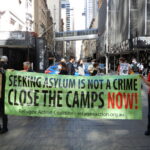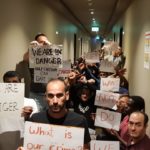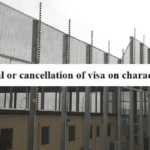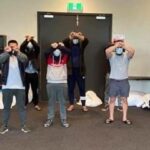Continued Legal Hotel Detention Confirms Australia a Human Rights Abuser in Law
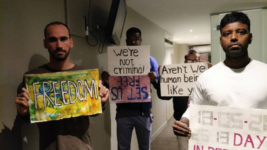
Federal Court Justice Bernard Murphy ruled on 6 July that the practice of detaining refugees and those deemed unlawful noncitizens in hotels, which are then referred to as alternative places of detention (APODs), is within the bounds of Australian migration law.
But the judge underscored that this did not mean that he subscribes to the practice, especially in relation to the specific case the legal challenge to APOD use related to, which involved well-known Kurdish refugee Mostafa “Moz” Azimitabar, who was very publicly detained in hotels for over a year.
This federal legal ruling indicates that there is, as the refugee rights movement has been indicating for decades now, something amiss in the laws governing this country if they result in outright human rights abuses, as is the case when it comes to hotel detention.
Indeed, Australian Human Rights commissioner Lorraine Finlay remarked in the Mandarin in the wake of the decision that “the mere fact that something is lawful doesn’t make it right”. And she’d released a report condemning the practice just weeks prior to the court delivering its decision.
This ruling comes too at a time when the nation’s rights standing has finally come unstuck globally, after years of Coalition-led lawmaking that’s incorporated violations of such rights into the legal migration system, so that instead of helping refugees, it criminalises and tortures them.
Legislated torture
Determined on 6 July, the Federal Court case saw Azimitabar challenge the lawfulness of the Australian government’s use of hotels to detain him specifically for over 14 months, commencing on 11 November 2019 through to 21 January 2021: a period that incorporated the COVID-19 crisis.
Prior to having been held in two hotels in Melbourne, Azimitabar had been detained on Manus Island by the government for six years, commencing in mid-2013 and continuing past the point when the Papua New Guinea Ministry of Foreign Affairs found him to be a legitimate refugee back in 2017.
This means Azimitabar didn’t illegally enter this country and continues to be owed the protections set out under the terms of the 1951 Refugee Convention, which Australia has been a party to since 1954.
Yet, refugee status didn’t bring the now 37-year-old’s PNG detention to a close, and rather, what did was the passing of the Medevac laws, against the wishes of the Morrison government, in February 2019, which allowed offshore detainees in dire need of medical treatment to be brought here.
What that meant, however, is that Moz and 191 other offshore captives, known as the Medevac cohort, were transferred into APOD detention and left to rot in small rooms with no access to the outside world for months, often with very minimal professional attention given to their health.
And despite the treatment Azimitabar suffered under it, Justice Murphy found that hotel detention is lawful under the Migration Act 1958 (Cth) and that the power in section 61 of the Australian Constitution provides the executive with the ability to use public money to pay the exorbitant costs.
Hotel detention is ongoing
Refugees rights advocates were protesting in May for the release of Iranian refugee Hamid from detention in Brisbane’s Meriton Hotel, where he’d been held in his room since February. And he was eventually transferred for further confinement in the BITA immigration facility on 7 June.
Hamid and the 70-odd other refugees who were left on Nauru at the beginning of 2023 have all been quietly transferred to Australia since January by the Albanese government. And after close to a decade of having been extralegally held there, the last remaining detainee was removed on 24 June.
But this in no way brings an end to the rights violating migration system’s use of offshore or APOD detention, while around 80 asylum seekers remain held in PNG, and the government is continuing to run the Nauru detention centre, as a deterrent, at a cost of $350 million a year to taxpayers.
Hamid’s case exemplifies how this form of detention can readily continue to be used to punish. And Refugee Action Coalition (RAC) spokesperson Ian Rintoul confirmed on Wednesday that Hamid remains in BITA, whilst one Afghan refugee is being held in the Parramatta Meriton Hotel in Sydney.
Agreeing but not complying
Released on 20 June, the Australian Human Rights Commission’s The Use of Hotels as Alternative Places of Detention (APODs) report made 24 recommendations, which included reserving APOD use to “exceptional circumstances and for the shortest possible time”.
The report found that APOD use had “severe negative impacts on people’s physical and mental health, which became progressively worse the longer a person was detained” and that in mid-2022, the average time spent in such confinement was 69 days, with the longest stretch being 634 days.
The Federal Court heard that Azimitabar, after being diagnosed as having “post-traumatic stress disorder (PTSD) and a major depressive episode” was brought here for psychiatric treatment but was then primarily confined “in a hotel room with a window that would only open 10 cm” for 14 months.
Finlay made clear on release of the report that many of the recommendations made “are long standing”, and while she welcomed Home Affairs having allowed AHRC to inspect hotel facilities, it is not simply enough for it to acknowledge such expert advice without acting on it.
For its part, the department responded that it is already working to reduce hotel detention times, via the placement of such people in immigration detention centres, and it’s “actively working” to reduce its reliance on the practice of using hotel rooms as prison cells.
However, whilst Home Affairs may have been able to claim expedited use of such detention when holding tennis star Novak Djokovic for five days in Melbourne’s Park Hotel in early 2022, the same couldn’t be said for the 32 asylum seekers, who’d already been inside the building for months prior.
An increasingly shaky standing
The Morrison government’s bumbling attempt at a show of force when it detained the tennis player on the ground that he might influence people not to have the COVID vaccination, and then deport him, also drew global attention to the use of hotels to detain refugees during the pandemic.
This came at a time when the nation’s human rights status was already being questioned in relation to its offshore detention systems, as well as due to the ABC’s exposure of the torture of First Nations children in Darwin’s Don Dale child prison in mid-2016.
The Don Dale revelations led the Coalition government to commit to implementing the OPCAT (Optional Protocol to the Convention Against Torture), which provides a UN-oversighted inspection regime designed to prevent human rights abuses in detention, which would include APODs.
But as of January, this nation has again missed an official deadline to have OPCAT running, and further, when the oversight body, the UN Subcommittee on the Prevention of Torture (SPT), came for its first inspection visit last October, it was basically run out of town by the NSW government.
As Australia OPCAT Network coordinator Steven Caruana recently observed, our nation narrowly escaped being placed on the OPCAT Article 17 list, along with countries such as the Central African Republic, the Democratic Republic of the Congo and South Sudan, for being “substantially overdue”.
This would have resulted in Australia having been the only OECD nation to have been blacklisted for OPCAT noncompliance, which would place it in the company of 14 less developed countries, many of which are notorious for their lack of rule of law and rights adherence.
And as for Moz, he continues to live amongst the Australian community after being detained by the government for around seven years. He’s being refused a permanent visa. And the federal court has now found the government is not liable for his torture, but he may have to pay court costs.



